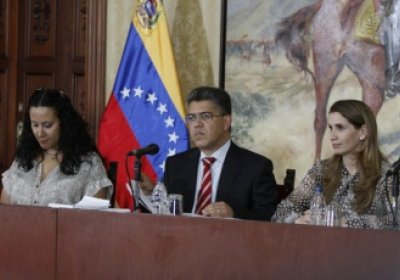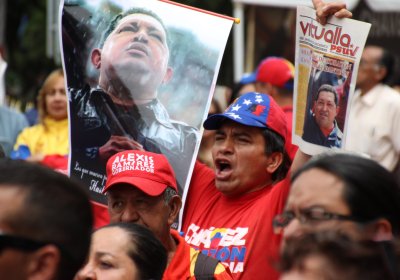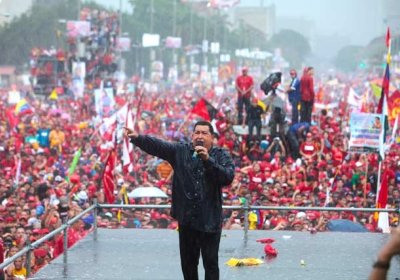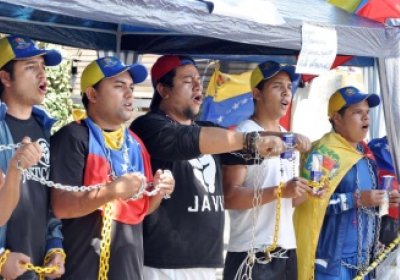Washington has simultaneously called for cooperation from Venezuela and worked to undermine the oil-rich nation's interim government.
Shortly after the death of socialist president Hugo Chavez on March 5, the White House issued a statement expressing an “interest in developing a constructive relationship with the Venezuelan government”.
“As Venezuela begins a new chapter in its history, the United States remains committed to policies that promote democratic principles, the rule of law, and respect for human rights,” the statement read.
Ryan Mallett-Outtrim
Former Guatemalan dictator Efrain Rios Montt will finally face prosecution for his crimes.
After a year of house arrest, Montt became the first former head of state to be charged with genocide in a Latin American court on January 28.
The prosecution believe they have compelling evidence that Montt led a campaign to ethnically cleanse the Central American state of its indigenous Mayan population.
Though he is being charged in relation only to the deaths of 1771 Mayans, about 200,000 people were killed or went missing during Guatemala's 1960-96 civil war.
When Venezuelans return to the polls in new presidential elections on April 14, analysts are predicting a decisive win for Nicolas Maduro, the candidate of the United Socialist Party of Venezuela (PSUV).
In December, the late president Hugo Chavez urged his supporters to back Maduro as PSUV candidate should Chavez’s worsening health prevent him from fulfilling his presidential term.
Under the Venezuelan constitution, new elections must be held within 30 days of the resignation or death of the president.
At about 5.30pm on March 5, life in Venezuela came to a sudden halt. In a speech broadcast live, Vice President Nicholas Maduro publicly announced that President Hugo Chavez had lost his two year battle with cancer.
Maduro stated that at 4.25pm, Chavez was pronounced dead after the emergence of a severe respiratory infection the previous day.
After urging for calm, the Maduro announced a number of security measures, including the deployment of the Bolivarian National Guard and police to maintain order.
Venezuelan media today announced that Venezuelan President Hugo Chavez has died.
At approximately 5.30pm local time on March 5, Vice-President Nicolas Maduro addressed the nation, stating that after nearly three months of treatment in Cuba and Venezuela, Chavez passed away in the Dr. Carlos Arvelo military hospital in Caracas.
“Those who die for life, can’t be called dead,” he stated, after announcing that the president has lost his two year battle with cancer.
Leaders of the developing world made renewed calls for greater solidarity and opposition to Western imperialism at the third Africa-South America Summit (ASA), despite some criticism of the role of Brazil in Africa.
Over February 20-23, 66 African and South American countries took part in the Summit, held in Malabo, Equatorial Guinea.
In an open letter read by Venezuelan foreign minister Elias Jaua, Venezuelan President Hugo Chavez denounced Western intervention in Libya and Mali, and urged the building of a “true pole of power” in the global South.
As Washington ramps up anti-Venezuelan rhetoric, its proxies in the South American nation appear to be following a US-backed plan to bring down the democratically elected government.
On February 15, opposition students began a four-day protest outside the Cuban Embassy.
The group of about students allegedly assaulted an elderly passer-by. In the past, members of the same group have allegedly been involved in blockading roads and burning tires during protests in the city of Merida.
Severe water shortages in the Sahrawi Arab Democratic Republic may become less frequent due to a Venezuelan government initiative to provide training to Sahrawi technicians.
SADR claims sovereignty over the entire territory of Western Sahara, most of which is occupied by Morocco. SADR administers about 20% of Western Sahara.
On February 14, the Venezuelan environment ministry said 10 technicians from SADR will be trained in hydro-geology and drilling at Venezuela’s National Hydraulics Laboratory.
Venezuelans rallied in support of their president, Hugo Chavez, on February 18 after his surprise return from treatment in Cuba.
In the early morning, Chavez had announced on Twitter he had arrived in Caracas after more than two months of cancer treatment in Havana.
Chavez tweeted: “We’ve arrived once again to the Venezuelan Homeland. Thank you God! Thank you beloved people! We’ll continue treatment here.”
Upon his return, Chavez was taken to the Dr Carlos Arvelo military hospital in Caracas, where he will continue treatment.
Last month a South Australian Police (SAPOL) officer asked me to monitor the activities of political activists in Adelaide.
On January 17, a plain-clothed officer approached me in a coffee shop. He explained that he recognised me as an activist, and told me he was with a special area of “security and intelligence” that aimed to create links between the police and the activist community.
He appeared interested in gaining information on the activities of environmental groups, the Boycott, Divestment and Sanctions campaign against Israeli products and Tamil solidarity actions.
The Israeli right-wing may not have lived up to expectations, but the real losers of Israel's national elections on January 22 were the Palestinian people.
Though they lost ground to more “centrist” parties such as Yesh Atid and Labor, the right-wing Likud-Beitenu alliance remains the largest bloc in the assembly.
Although he will remain prime minister, Benjamin Netanyahu will probably have to compromise with moderates to form a coalition.
Venezuelans went to the polls for the second time this year on December 16, and delivered another overwhelming victory to President Hugo Chavez’s United Socialist Party of Venezuela (PSUV).
Chavez is leading a process of social change, known as the Bolivarian revolution, that has halved poverty in the oil-rich nation and promoted participatory democracy.
After presidential elections returned Chavez with more than 55% of the vote, the PSUV increased its majority of state governorships and legislatures.
- Previous page
- Page 4
- Next page








